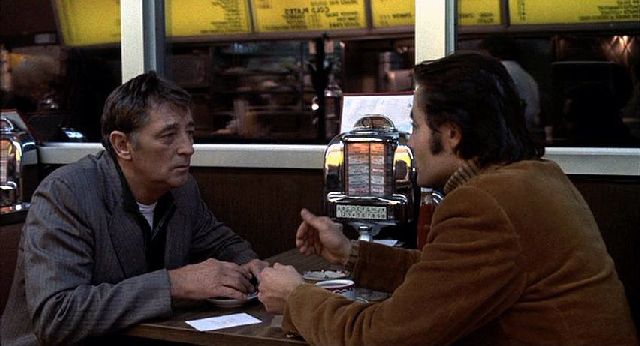The Friends of Eddie Coyle (1973) 
“It’s a grubby, violent, dangerous world. But it’s the only world they know. And they’re the only friends Eddie has.”

Director: Peter Yates
Cast: Robert Mitchum, Peter Boyle, Richard Jordan
Synopsis: After his last crime has him looking at a long prison sentence for repeat offenses, a low level Boston gangster decides to snitch on his friends to avoid jail time.
Eddie Coyle (Robert Mitchum) is a small-time villain acting as the middle-man between Jackie Brown (Steven Keats), seller of stolen firearms, and Jimmy Scalise (Alex Rocco) one of a gang of bank robbers. Eddie’s is not a life of criminal glamour. He lives in a modest home in Boston with his plump, homely wife and three kids who don’t seem to like him too much. His criminal transactions take place in bowling alleys and supermarket car parks. He’s recently been convicted for the latest misdemeanour in a long history of petty crime, and is facing a three-to-five year sentence that he’s desperate to avoid.
Eddie contacts police detective Dave Foley (Richard Jordan) in the hope that he will put in a good word with the prosecutor for him in return for information that will lead to the arrest of Brown. At the same time that he’s feeding this information to Foley he’s also continuing to supply guns to Scalise and his colleagues.
The Friends of Eddie Coyle is a tale of an everyday criminal, the type of man battered by a life of loss and inconsequence. He provides information and it’s acted upon. He’s not the only one. A friend is also feeding information to Foley, and he needs to find a scapegoat in order to cover what he’s done. In an early scene between Eddie and Jackie, the older man remembers how the nuns at his school used to hit him on the hand with a ruler when he misbehaved, and how, when he refused to offer his hand, a nun slapped him across the face (‘it hurt like a bastard.’) The moral is to take your punishment, but it’s a lesson Eddie only thinks he’s learned, because the film shows him falling into the same trap he warns Jackie against.
The film follows Jackie’s exploits as much as it does Eddie’s. The role was Steven Keats’ screen debut, and he’s incredibly good in the role of an amoral but strangely likeable hood. Brown isn’t so much a thug as a businessman who happens to operate in an illegal market. If he was doing the same job for his government he’d be a highly paid executive, but Jackie is small time. He’s not as small as Eddie but he’s only a step or two above him. Keats was a fine actor, but his career never seemed to take off the way he might have expected it to. He killed himself when he was only 49-years-old.
You can bet your life Quentin Tarantino saw and loved this movie. It’s the kind of film he wished he could make but never will because he’s too steeped in movie history and doesn’t really understand what motivates people like Eddie Coyle and Jackie Brown. Tarantino has this urge to make his characters larger than life, no matter how unscrupulous they might be, whereas Paul Monash, working from a George V. Higgins source novel, concentrates on making his characters as ordinary as he possibly can. Tarantino’s on record as stating that Keats’ character didn’t serve as the inspiration for the title of his 1997 movie, but I’m not so sure. He’s prone to borrowing all kinds of things from all types of movies, and Keats is exactly the kind of actor whose career Tarantino would have loved to have revived.
There’s not a lot of gunplay in The Friends of Eddie Coyle. Not too much violence — although the threat of it often hangs unspoken over a scene. The atmosphere created by director Peter Yates has an authentic feel about it. A modern director would use a hand-held camera in an attempt to capture that real-life feel, but Yates didn’t need to resort to such obvious tactics. He knew that if the script was good enough, and the actors accomplished enough, then all he had to do was train his camera on them and let them get on with it. So, a lot of the time we’re just watching a couple of guys talking, but we’re never less than totally absorbed in their world and their business. They could easily be the guys loading groceries into the boot of a car, or sitting a couple of tables away from you in some nondescript cafe.
(Reviewed 7th February 2013)
httpv://www.youtube.com/watch?v=vWdqoPHW-F8
